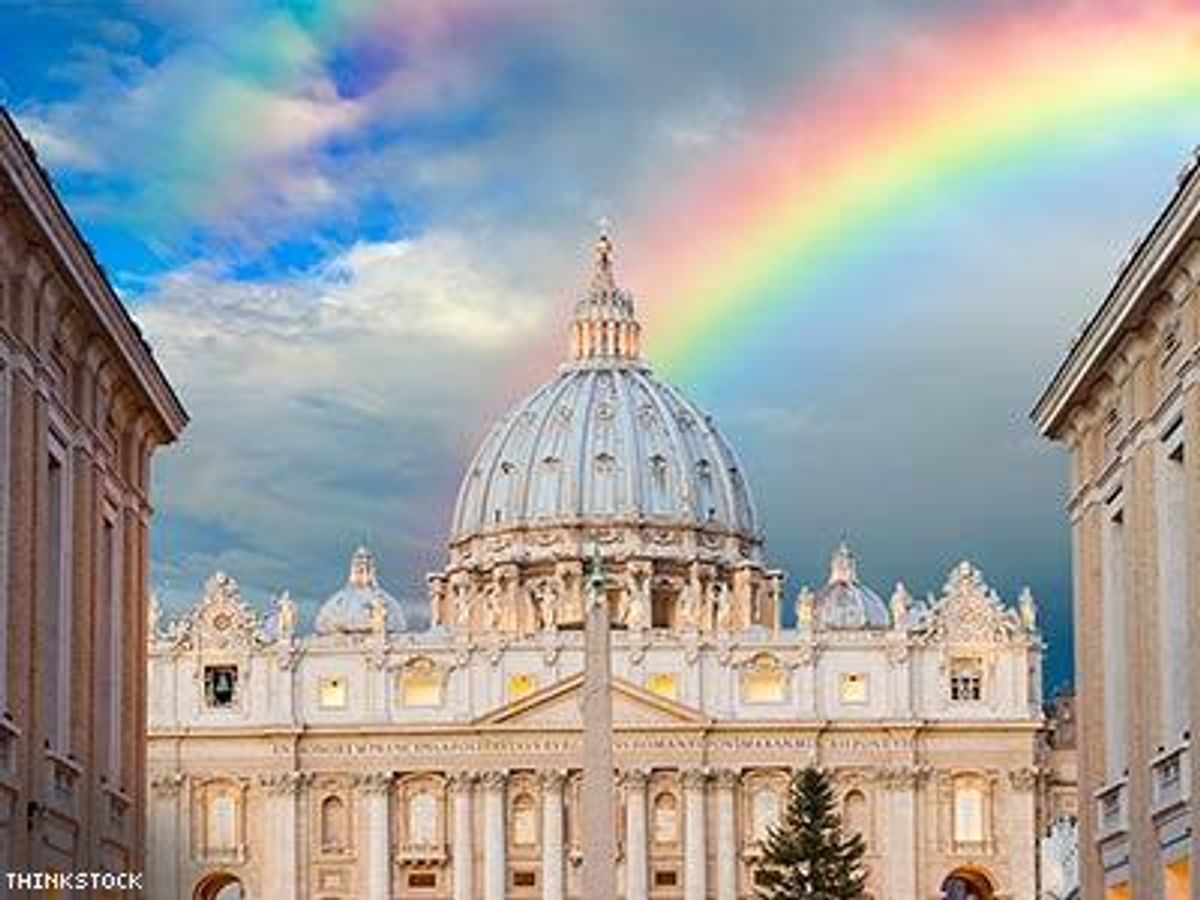The news from the Vatican that Catholic parishes should reach out more warmly to lesbian and gay people opens up a whole new era of discourse in the Church concerning sexuality. The statement from church officials calls on Catholic communities to be "accepting and valuing" lesbian and gay people's sexual orientation, and to recognize that lesbian and gay people "have gifts and qualities to offer to the Christian community."
These simple directions don't change doctrine about same-sex marriages, and the church's opposition to this social development still stands. But in fact, words like these are a total game-changer. While a change in language and tone, but not of substance, may seem insignificant, this perspective misses the point that a change in language and tone is the necessary first step toward more substantial change in the Catholic Church.
This document and Pope Francis's many gay-affirming statements represent that first step. The language shift emboldens church ministers to change pastoral practice. Catholic parishes and schools can now take greater steps to include lesbian and gay people in their faith communities. This might include establishing faith sharing groups for LGBT people, appointing lesbian and gay people to leadership roles and visible ministries, including sexual orientation in educational programs, and involving the parish with gay community organizations that help vulnerable populations such as youth.
As pastoral practice develops, church leaders will become more familiar with lesbian and gay people and issues, ending the long unnatural silence in local church settings about LGBT topics. Fear of being reprimanded for being too gay-accepting kept pastoral ministers from even acknowledging that lesbian and gay people existed. The new language promises to change that fearful attitude, and it is very likely that we will see pastoral ministers begin much bolder initiatives.
Change in pastoral practice will eventually lead to change in doctrine. As church leaders reflect on the activities of their faith communities, they will see that the Christian message of love has come alive in this new outreach. Eventually, the doctrine will change. It's hard to put a timeline on such an enterprise. God moves in mysterious ways, and often on an even more mysterious schedule.
But the Vatican's new message holds the promise for even greater change than LGBT acceptance. Since Catholics are now being called to recognize the gifts that lesbian and gay people bring to the Church, the Church itself can be transformed. If the gifts of gay and lesbian people are truly accepted, Catholicism will be forever changed.
Many Catholic parishes and colleges have already been welcoming LGBT people into their midst for many years now. In addition to helping LGBT people, these institutions have themselves been transformed into more loving and just places. Why? Because LGBT people bring their unique spiritual journeys to the community, and all benefit from their insights and perspectives. Because LGBT people have had to face up to difficult odds to come to self-awareness and self-acceptance, their spiritual journeys produce powerful traits from which the whole community can benefit. For example, because LGBT people have had to learn how to recognize the truth about their identities, usually in the face of great social pressure, they often have the gift of being courageous truth-tellers. The Catholic community badly needs the ability to tell the truth, as the clerical sexual abuse crisis has shown.
Another spiritual gift that comes from this truth-telling is the gift of self-love. Because negative messages encourage LGBT people to hate themselves, they develop a strong sense of self-love to counter these earlier feelings. This self-love is not a selfish idea, but a healthy and holy assessment of one's strengths and weaknesses. Self-acceptance often helps to propagate the wonderful sense of humor which we see in the LGBT community: the ability to laugh at one's foibles. A more humorous Church would be a blessing!
Similarly, LGBT people often recognize the intimate connection between sexuality and spirituality. Because recognizing the goodness of human longings and desires to give and receive love has sometimes been a struggle, LGBT people often perceive that sexuality is a spiritual experience that not only strengthens relationships between persons, but also with God. This insight is a gift which other people in the church - heterosexuals, young people, older people, married, single, and celibate - need desperately.
Though the new Vatican document is still a work in progress, which will be debated both this week and in the coming year, this version reveals that a strong current of gay-affirmative thinking exists among some very highly-placed Church officials--something which was not evident even just a week ago. These leaders will certainly be working to maintain this spirit of inclusion, and, perhaps even to strengthen it. Both the Catholic Church and the LGBT community will benefit from such a partnership.
FRANCIS DEBERNARDO is executive director of New Ways Ministry, a national Catholic ministry of justice and reconciliation for LGBT people and the Church. He blogs at Bondings 2.0.


















































































